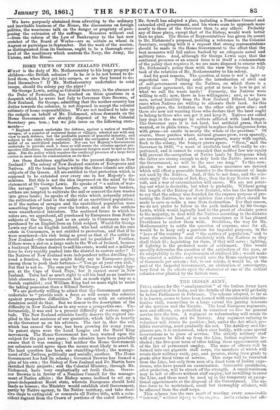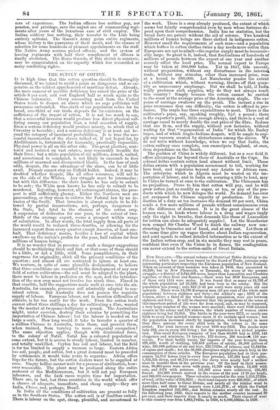THE INDIAN ARMY.
Frrran orders for the " amalgamation" of the Indian Army have been despatched to India, and the details of the plan will probably be before Parliament in February. The scheme adopted, so far as it is known, seems to have been framed with considerable adminis- trative skill, reconciling to a large extent the jarring interests of the services and the Empire. The local European regiments, men and officers, are permitted to volunteer en bloc for general service into the line. A regiment so volunteering will retain its name, its insignia, and its history. Any regiment refusing to volunteer will retain its position ; but, under the Act which pro- hibits recruiting, must gradually die out. The Artillery and En- gineers are, it is understood, taken over bodily, with some special reservations as to place of service. The strictly military staff will of course be filled up from the Line, Indian regiments in- cluded; the five-year term of office taking these appointments out of the list of permanent employ. The mass of officers will be formed into one gigantic staff corps, the members of which will retain their military rank, pay, and pension, rising from grade to grade after fixed terms of service. This corps will be recruited from the Line, but only from men of a fixed term of Indian expe- rience, who have passed an examination. Successful candidates, after probation, will be struck off the strength. A small residuum may be left of officers without staff employ, but unwilling to enter the Line, and these must be used up in the temporary or excep- tional appointments at the disposal of the Government. The na- tive force to be maintained, small but thoroughly efficient, will be officered from the staff corps.
This scheme has the rare merit of meeting every conceivable "interest," without injury to the siid.ire. India ietairus her offi-
oers of experience. The Indian officers lose neither pay, nor pension, nor privilege, save the unjust one of commanding regi- ments after years of the luxurious ease of civil employ. The Indian soldiery lose nothing, their transfer to the Line being entirely optional. The Queen's Army gains entire regiments, whose history is the guarantee of their merit, and the chance of selection for some hundreds of pleasant appointments on the staff. The Native Army secures picked officers, and the system of leaving regiments with half their complement of officers is finally abolished. The Horse Guards, if this sketch is accurate, may be congratulated on the capacity which has reconciled so many conflicting rights.



























 Previous page
Previous page